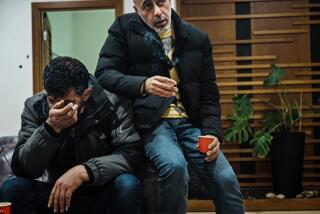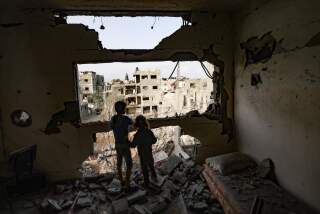Hussein’s Birthplace Under Wraps
- Share via
AL AUJA, Iraq — Welcome to the birthplace of Saddam Hussein. Some call it a detention center. Some call it a gated community. Either way, it is Iraq’s most extraordinary neighborhood.
Since last week, this attractive Tikrit suburb overlooking the Tigris River has been surrounded by four miles of razor-sharp concertina wire and guarded by heavily armed U.S. troops.
Enclosed by the wire are the homes of Hussein’s relatives: 3,000 people who trace their common lineage back as far as 10 generations -- and who prospered under the deposed dictator’s rule.
Today, all but one of the entrances to Al Auja have been sealed. No one can go in or out without the U.S. Army’s permission. Every male older than 15 must register with police and show a newly issued identification card at the gate. All vehicles are searched coming and going. U.S. trucks and tanks patrol the streets.
Officials, who have been scouring the country for Hussein, say they are confident that he is not holed up in the town. They say they began imposing the new restrictions Friday to protect residents from the lawlessness of the new Iraq and from the former president’s enemies.
But that’s not how Hussein’s many cousins see it.
“It’s like a big jail,” said Musaab Gazi Khattab, 23, a distant cousin who was a student at the Air Force College until the war ended his studies. “Auja has been surrounded.”
Al Auja, which is 100 miles north of Baghdad, means “crooked” in Arabic and got its name from the shape of a hill near the village. Hussein was born in 1937 in a mud hut near the river.
After he took power, the village became an oasis of luxury. The relatives used their newfound wealth to build two-story brick homes. The most powerful constructed huge mansions. Hussein built one of his 73 palaces in the town. There are also modest one-story homes occupied by other cousins of Hussein who work as taxi drivers and plumbers.
Al Auja also is distinguished by its orderly, clean streets, wide sidewalks and antiaircraft gun emplacements on the edge of town. Just south of Hussein’s stronghold of Tikrit, the town was an important power base and many of the men who helped him run the country grew up here. Of the 55 former officials in the U.S. military’s most-wanted-Iraqis deck of cards, about 30 are from Al Auja, authorities say.
When U.S. troops invaded Iraq, the enclave was among the first places they searched for Hussein. Tikrit Gov. Gazi Khattab -- Musaab’s father -- was killed when soldiers raided the governor’s palace, residents say.
Most of the men in town have been taken in for questioning since the American occupation began, residents say, and soldiers have searched many houses.
Support for Hussein still runs deep in Al Auja. The townspeople are proud of the deposed dictator and their Nasseri tribe, which they like to claim is descended from the prophet Muhammad.
The clan is close-knit, and marriage among cousins is common. Some residents bear an uncanny resemblance to their better-known relative. One distant Hussein cousin, who declined to give his name, looks so much like the fugitive that he keeps getting arrested and questioned by U.S. soldiers, he said.
“I am a patriotic Iraqi citizen just like Saddam Hussein,” he said, sitting in his car near Saddam Hussein Street. “We all hope we will be like Saddam Hussein. We must try to be like our great leader.”
He likened the new security arrangement to the West Bank, where Israel is building a wall to restrict Palestinian access to Jewish areas. “Our town is like Gaza and Jericho,” he said.
U.S. Army Capt. Brent Harrington, who heads the troops guarding the community, said the security fence was installed because occupation forces would soon build a bridge across the river that would increase traffic in the area. The concertina wire, he said, was to keep strangers from entering Al Auja.
“They have a level of security most people don’t have,” he said. “Once they get their ID cards, they are free to come and go. You could compare it to one of those gated communities.”
Well, perhaps.
Al Auja residents are certain that the security measures are meant to hem them in and allow U.S. authorities to keep a close watch over them.
After all, U.S. soldiers don’t register, photograph and take the left thumbprint of residents in every gated community. “We are being treated like prisoners,” said Brig. Gen. Abdul-Salam Nasiry, a distant Hussein cousin who studied aviation engineering in the former Soviet Union. “It’s like a concentration camp.”
Harrington said authorities have registered 1,000 boys and men and issued ID cards to them, which record their occupations, the color of their eyes and the make and color of their cars. Residents have also been asked to report how many people live in the house next door.
“It is very painful,” said another Hussein relative who asked not to be named. “We feel like we are being treated differently. Do they consider us terrorists?”
“It will help us track down the bad people,” Harrington said.
Ahmed Hamza Barrak, who was installed as Al Auja police chief by the U.S. five months ago, also grew up there. He traces his common ancestry with Hussein back nine generations.
His uncle, Fadhel Barrak, was a childhood friend of Hussein who rose to become Iraq’s intelligence chief. In 1991 Hussein had him executed for opposing the 1990 invasion of Kuwait.
The younger Barrak is one of the lucky few to defy the Hussein family and live to tell about it.
He said he was an army captain when Hussein’s brutal son, Uday, asked him to become his bodyguard. Barrak refused. Uday promised his cousin that he would never rise any higher in rank and ordered him transferred from one remote border post to another every six months.
By the time the regime collapsed, Barrak said, he had become the oldest captain in the army, at 35, while his contemporaries had all become colonels. That put him in a good position when the U.S. was looking for capable officers. Iraqi officers holding the rank of colonel and above are barred from serving in the new army or police force.
Although some of his cousins may view him as a collaborator with the U.S. occupiers, Barrak sees part of his job as protecting his relatives from attacks by outsiders who hate the former regime. “We have many enemies, the tribe of Saddam,” he said. “We are concerned about retaliation against our families. People might bring a car bomb.”
After Uday and his brother, Qusai, were killed in a shootout with U.S. troops in July, their bodies were sent back to Al Auja for burial in the cemetery just outside town. Barrak picked up their coffins at the airfield.
“Maybe if I had worked for Uday,” he mused, “I would have been the 56th card.”
More to Read
Sign up for Essential California
The most important California stories and recommendations in your inbox every morning.
You may occasionally receive promotional content from the Los Angeles Times.













